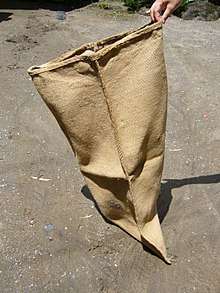Gunny sack
A gunny sack, also known as a gunny shoe or tow sack, is an inexpensive bag, historically made of hessian (burlap) formed from jute, hemp, or other natural fibers. Modern sacks are often made from man-made products such as polypropylene.

The word gunny, meaning coarse fabric, derives from an Indo-Aryan language.[1] Reusable gunny sacks, typically holding about 50 kg, were traditionally, and to some extent still are, used for transporting grains, potatoes and other agricultural products. These are widely seen in India, Pakistan, Bangladesh, etc. In Australia, these sacks, made of Indian jute, were known traditionally as 'hessian sacks', 'hessian bags' or 'sugar bags'.[2]
Today they are also sometimes used as sandbags for erosion control. Gunny sacks are also popular in the traditional children's game of sack racing.
Size
A gunny sack holds approximately 50 kg (110 lb) of potatoes. Even though gunny sacks are no longer used for that purpose, among farmers in Idaho, United States the common measurement unit of potatoes is still the "sack".[3]

See also
Cultural references
- Referred to as a tow sack in Polk Salad Annie by Tony Joe White
- Referred to in the lyrics of Chuck Berry's "Johnny B. Goode" - 'He used to carry his guitar in a gunny sack'. Indicative of the character's poverty.
- In “Wizard People, Dear Reader”, the package containing the Philosopher’s Stone is referred to as a “silly little gunny sack” by Brad Neely.
- Referred to in the lyrics of Dolly Parton’s “Why’d You Come in Here Lookin’ Like That?”
References
- "gunnysack". Merriam-Webster Online Dictionary. Merriam-Webster. Retrieved September 18, 2018.
- Hassam, Andrew (2011). "Indian Jute in Australian Museum Collections: Forgetting and Recollecting Transnational Networks". Public History Review. UTSePress. Vol 18 (2011): 108–128.
- South, David B. "Protect Your Potatoes". Accessed 2015-06-10.